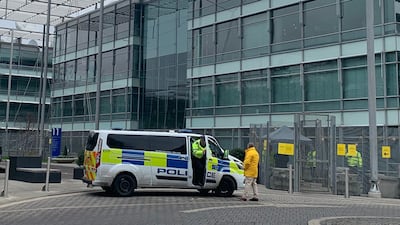As Iran’s morality police resume their patrols to surveil the Iranian people and Tehran provokes the West in the Gulf by seeking to seize two oil tankers, it is high time for the UK to face the facts.
Iranian power has expanded to a degree that demands a coherent British and allied response, one that deters escalation, curbs Tehran's ambitions, ensures regional stability and champions human rights.
For far too long, the debate in the UK has constructed Iran policy solely around Tehran’s nuclear programme.
But the threat Iran poses is strategic and geopolitical in nature – not simply nuclear.
Passivity will increase vulnerability and invite Iranian aggression, argues Policy Exchange’s new paper The Iran Question and British Strategy.
The paper sets out to rigorously examine British national interests in the region and towards Iran. London has an opportunity to secure the British national interest in a period of accelerating strategic rivalry.
In an increasingly unstable Eurasian environment, the Middle East is of central importance.
Europe may be the UK’s geopolitical backyard, while the Indo-Pacific’s economic dynamism and growing political instability compels significant strategic attention through the government’s well-articulated tilt.
But the Middle East is the crucial connecting point between these two regions, with one of the world’s busiest maritime routes, the Suez Canal, running through it.
It is also a global energy powerhouse, contains a number of British partners including Saudi Arabia, the UAE and Israel, and is home to hundreds of thousands of UK citizens.
The Iranian nuclear programme, to be sure, is eminently capable of providing Iran with nuclear weapons. But Iran’s ambitions are not simply nuclear.

Iran seeks to transform the Middle East similarly to how Russia seeks to transform Europe: reordering the region around its interests and thereby dealing a significant – if not fatal – blow to London's strategy, bullying and destroying UK allies, and holding hostage the region’s British residents.
To fulfil its strategy, Iran has created a proxy network throughout the Middle East, including elements in Lebanon, Syria, Iraq and Yemen, which are united by their fundamental hostility towards the West.
It has constructed a sophisticated missile and drone arsenal to threaten British forces and those of its allies. And it has a robust sanctions-evasion system that rests upon an illicit cash network, providing it links to global organised crime.
And Iran’s activities are not restricted to the Middle East.
Iran has become Russia’s most critical ally in its attempt to conquer Ukraine. Iran transfers critical drone technology to Russia, has constructed a military factory within the country to produce more weapons and is likely to offer Moscow ballistic missiles later this year.
Iran’s partnership with Russia is the most telling aspect of its overall strategy.
Tehran also operates with near-impunity in the UK and Europe, intimidating, attempting to abduct and even killing regime opponents.

MI5 director Ken McCallum and Counter-terrorism Policing lead Matt Jukes identified 15 Iran-linked plots in the UK in 2021. Those plots have almost certainly increased this past year.
Securing British regional interests requires a carefully calibrated policy that leverages every tool at the UK’s disposal. This plays to our strengths.
While the UK is not a superpower, it has world-leading capabilities in every area: a robust diplomatic network, access to global financial centres, first-class intelligence services, and a network of allies and partners on every continent.
Harmonising these capabilities will create a policy far greater than the sum of its parts. A diplomatic approach that triggers the Iran nuclear deal’s snapback process will throw Tehran's nefarious international behaviour into stark relief.
Reinvigorated partnerships with Gulf states and Turkey will improve regional deterrence and undermine Iran’s links to Russia.
A robust financial intelligence capability will amplify the effect of British sanctions, while prudent regulatory scrutiny will crack down on illicit Iranian cash flows, starving Tehran of financial means. The publication of Iran’s crimes against its people will undermine its credibility.
Military shifts, closely co-ordinated with British allies, will demonstrate the UK's resolve, thereby reducing the odds of Iranian escalation.
Today, Iran acts with impunity, subverting British interests abroad and pressuring society at home.
Deterrence requires a clear demonstration of credibility and resolve, and it can be achieved only through the integrated deployment of British means.
Inaction, meanwhile, invites future challenge. A deferred crisis today guarantees future escalation.
Harry Halem is a Research Fellow in Defence at Policy Exchange and a co-author of the report The Iran Question and British Strategy.

